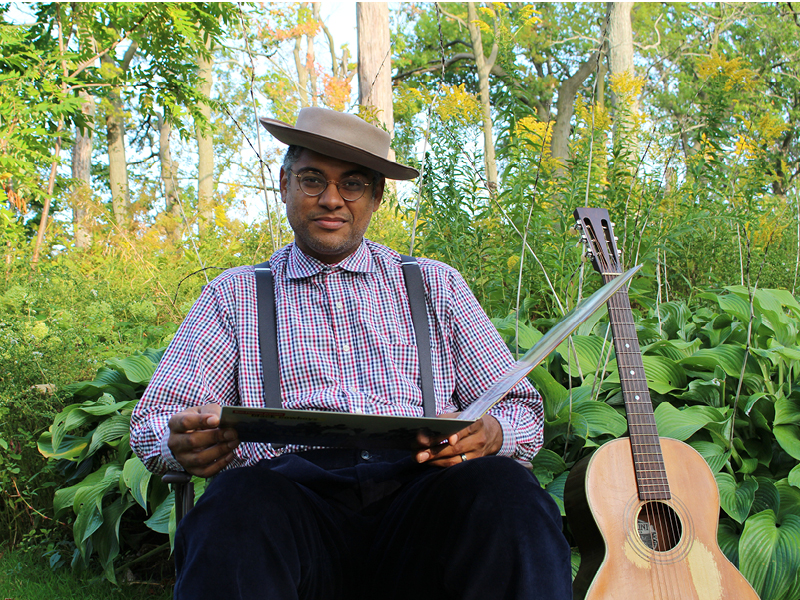Give me a home, where the buffalo roam, Where the deer and the antelope play, Where seldom is heard, a discouraging word, And the skies are not cloudy all day.
The iconic lifestyle of the American cowboy is glamorized in books and film often depicting grueling work and intense shootouts between those who don’t see eye to eye. Thankfully, at the end of the day, the cowboys get to relax a bit near a tranquil fire and the sounds of a soulful harmonica or guitar player leading a singalong or accompanying a colorful storyteller.
While many of those depictions were based on stories of the developing American West, like much of the country’s history, a huge segment of the human population was left out.
As the cowboy culture continued through the decades and the ever-shifting frontier, the roles of men and women of the Texas ranch culture found their way to driving cattle along trails and then to railroad depots. Along with the work came the traditional campfire singing and storytelling near the “iron horse” railways. From trails to rails to “home on the range,” generations later, that cowboy culture found its way into communities along the railways as well as ranches that continue to honor the wide open spaces and stars at night through the music and storytelling that keeps that spirit alive.
One popular musician helping to reframe the narrative of cowboy culture is Grammy winner Dom Flemons. He rose to prominence with the string band the Carolina Chocolate Drops and is known as “The American Songster” with his repertoire covering more than 100 years of American roots music including country, folk, bluegrass, Americana, and blues. His work on musical and historical projects is featured in recordings, stage performances, speaker programs, and workshops across the country.
He made his solo debut on the Grand Ole Opry in 2018 and has been on the show going back to 2008.
In 2018, Flemons released an album on Smithsonian Folkways Recordings titled Dom Flemons Presents Black Cowboys as part of the African American Legacy Recordings series co-produced with the Smithsonian National Museum of African America History and Culture in Washington, D.C.
“When it comes to Black cowboys, to find that close to one in four of these brave men who herded the longhorn steer were Black, it gives a completely different impression of who helped shape the West into what it is today,” Flemons says.
The album tells the story of lesser known historical figures, bringing Black contributions to country music and western history to the forefront of popular culture. The album and Flemons won many prestigious awards and peaked at #4 and spent more than 55 weeks on the Billboard Bluegrass Charts. Black Cowboys pays tribute to the music, culture, and the complex history of the golden era of the Wild West. In this single volume of music, the first of its kind, Flemons explores and re-analyzes this important part of American identity. The songs and poems featured on the album take the listener on an illuminating journey from the trails to the rails of the Old West. This century-old story follows the footsteps of the thousands of African American pioneers who helped build the country.
Included with the album is an extensive, informative pamphlet on the history of Black cowboys and their music.
“The legacy of the original Black cowboy singer continues to live on with the songster tradition,” Flemons says. “These African American folk and blues singers, like Lead Belly and Henry “Ragtime Texas” Thomas (both with deep East Texas roots), provide glimpses into a larger story that connects the past and future of cowboy music.”
Part of Flemons’ mission is to highlight the contributions from those of African decent to cowboy, country, and various other forms of the roots Americana experience that are long part of the fabric of shaping those genres but rarely get the attention they deserve.
“I have found that since the release of my album Black Cowboys, the reverberations of popular culture have been overwhelming. My hope was to shine a light on the history so that it could eventually be given a stronger platform.”
When pop icon Beyoncé — the most awarded artist in Grammy history — released her smash 2024 country single “Texas Hold ‘Em,” the world reacted, often like it was the first time they’d ever heard someone of African decent in the country music lane. Far from true, besides all the people whose shoulders she stands on in distant history, in more recent decades, acclaimed Black country music stars include DeFord Bailey, who was the first performer on the Grand Ole Opry; the legendary Charley Pride; Linda Martell, who’s 1970 album Color Me Country entered country’s Top 40; honky tonk vocalist Stoney Edwards; The Pointer Sisters, with their 1974 song “Fairytale,” a Top 15 country hit; and former Hootie & the Blowfish frontman Darius Rucker who embarked on a country solo career in the late 2000s. Ray Charles often crossed over the R&B lane into country. Even Tina Turner released an album of country songs, Tina Turns the Country On, which earned a Grammy nomination. Others who ventured into the country genre from time to time include Aaron Neville, Frankie Staton, Howdy Glenn, Cleve Francis, and Cowboy Troy, to name a few.
Making history in the genre today, Mickey Guyton was the first Black woman nominated for a solo Grammy in a country music category in 2021 for her song “Black Like Me.” Just this summer Guyton released a new single, “My Side of the Country,” exclaiming “We wear Levi’s, take slow rides on Sundays too.” The song is on her album, House on Fire, releasing September 27.
Other up and comers and modern influencers making their mark on country, folk, and Americana music today include Jake Blount, Rhiannon Giddens, Kane Brown, The War and Treaty, Breland, Brittney Spencer, Lil Nas X, Allison Russell, Amythyst Kiah, Blanco Brown, Chapel Hart, Julie Williams, Reyna Roberts, Valerie June, Adia Victoria, Willie Jones, and Miko Marks.
Country singer-songwriter Rissi Palmer does an Apple Music Country radio show, Color Me Country Radio, spotlighting Black, Indigenous, and Latinx artists in country music.
Also notable is Alice Randall, a renowned songwriter, best-selling author, and university professor who’s written No. 1 hits for Trisha Yearwood and Reba McEntire and is the author of My Black Country: A Journey Through Country Music’s Black Past, Present, and Future.
No doubt more contributions by Black artists would have made it into the country and western lanes of the past had they been welcomed. Today, the genre is beginning to reflect a more inclusive narrative.
“I believe the current state of Black roots music is very exciting,” Flemons says. “People are being activated by the work that has been done by the pioneers of the past 100 years. They are reinterpreting, reinventing, and showcasing music that is becoming a viable part of the mainstream music industry. They come with a variety of sounds, instruments, and songs that will shift the template of American culture, as Black roots music always has and always will.”
See Chicago-based Dom Flemons talk about the songs and poetry of Black roots music at 1:30 p.m. Friday, September 27, at the Winnsboro Center for the Arts in East Texas. Part of the annual Winnsboro Cowboy Music & Poetry Gathering, Flemons is joined by songster Andy Hedges for Cowboy Culture Conversations where they take listeners on an illuminating journey of the Old West and follow the footsteps of Black cowboys who helped build America.
Flemons is also scheduled to perform at 7 p.m. Saturday, September 28, as part of the Carnegie Hall Cowboys show on the Bowery Stage at the art center, along with Hedges and Pipp Gilette.
“To be able to share the story of Black cowboys and pioneers of the West with the crowd in Winnsboro is a moment that I can only describe as full circle,” Flemons says. “One of the songs I feature in my show is a number called “Charmin’ Betsy” which I first heard from an East Texas songster by the name of Henry ‘Ragtime Texas’ Thomas, who made records in the late 1920s. He played guitar and used a special panpipe called the ‘quills’ that gave him a distinctive sound that inspired me to dig deeper.”
Flemons says the music of East Texas is distinctive because of its proximity to Louisiana and Arkansas, which created a rich musical mix unlike any other place.
“I have always enjoyed the blues music to come out of this region, including the songs of Lightnin’ Hopkins, Mance Lipscomb, Bongo Joe, and Lil Son Jackson,” he says. “The music is downhome, raw and right to the roots.”
Although he lives in Chicago, Flemons’ own roots are embedded in East Texas with his grandfather, great grandparents, and many relatives from his father’s side living there for many generations.
“My great grandfather Charles Flemons was a fiddler who played in square dances throughout the region and my uncle was a guitar player who played alongside him too.”
To learn more about Dom Flemons, visit theamericansongster.com and hear him live on WSM Home of the Grand Ole Opry, American Songster Radio, now in its fifth season.
See the full schedule, fees, and more information about the Winnsboro Cowboy Music & Poetry Gathering on winnsborocenterforthearts.com or call (903) 342-0686.
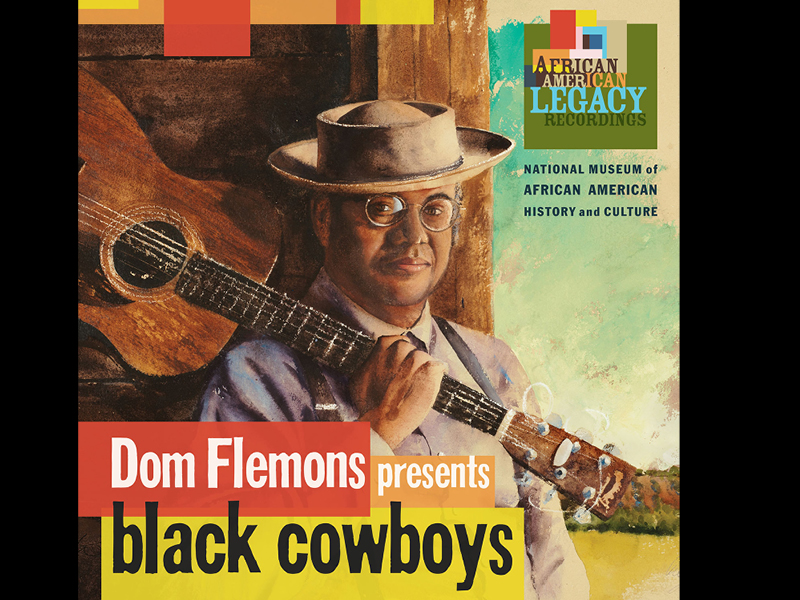
In 2018, Flemons released an album on Smithsonian Folkways Recordings titled Dom Flemons Presents Black Cowboys as part of the African American Legacy Recordings series co-produced with the Smithsonian National Museum of African America History and Culture in Washington, D.C.
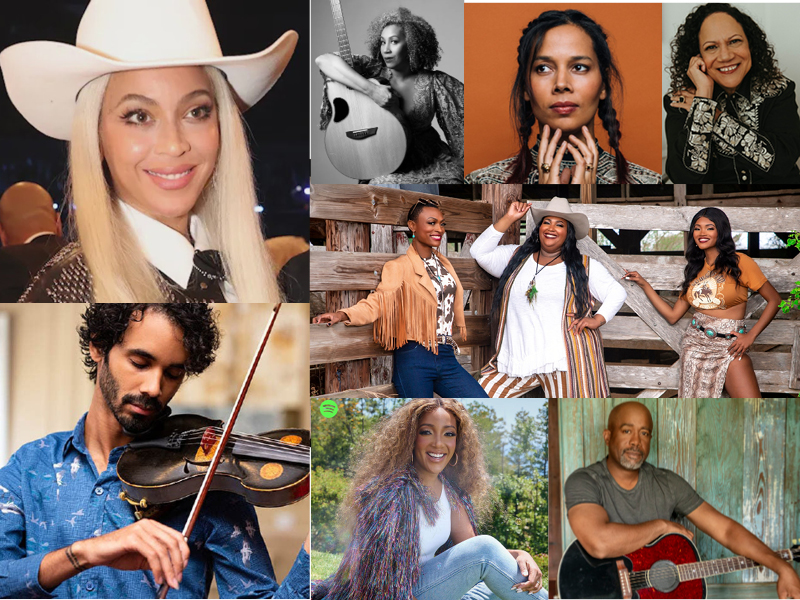
The list of Black performers making history in the country music lane in recent years include multi-Grammy winner Beyonce, former Hootie & the Blowfish frontman Darius Rucker, Mickey Guyton, Jake Blount, Rhiannon Giddens, Kane Brown, The War and Treaty, Breland, Brittney Spencer, Lil Nas X, Allison Russell, Amythyst Kiah, Blanco Brown, Chapel Hart, Julie Williams, Reyna Roberts, Valerie June, Adia Victoria, Willie Jones, and Miko Marks.
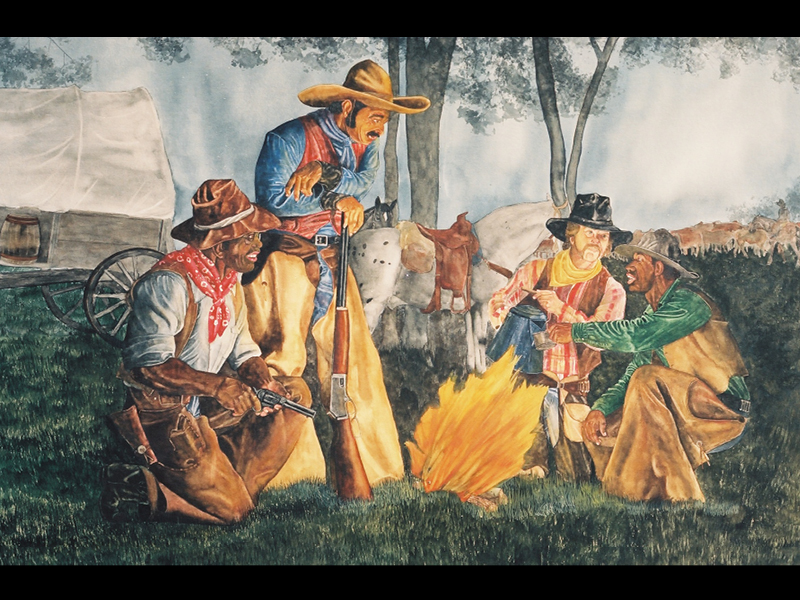
“Telling of Legends” is one of many Western artworks by Burl Washington. The paintings depict historical accounts of multiracial cowboy gatherings during trail rides and along railways as they drove cattle to buyers. Country, blues, and other music genres were influenced by the music that came from cowboy trail campfire songs.
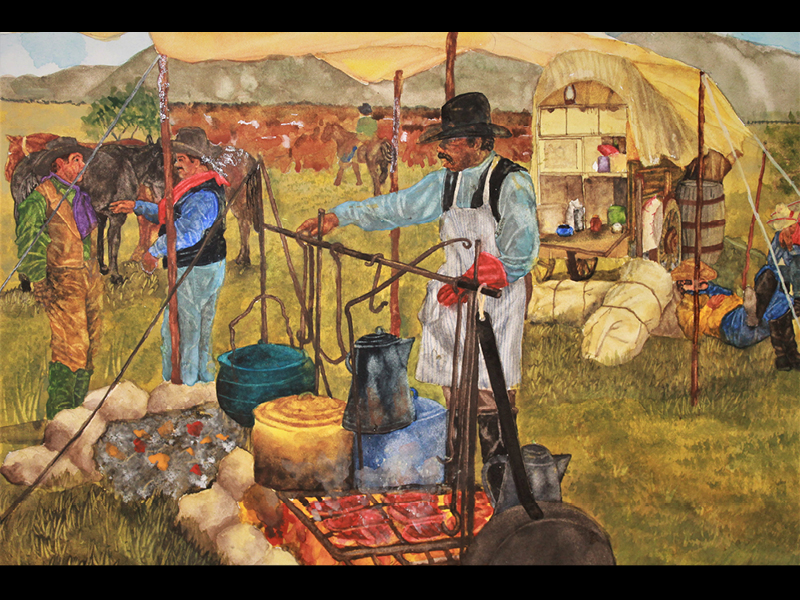 “Campfire Vittles” by Burl Washington.
“Campfire Vittles” by Burl Washington.
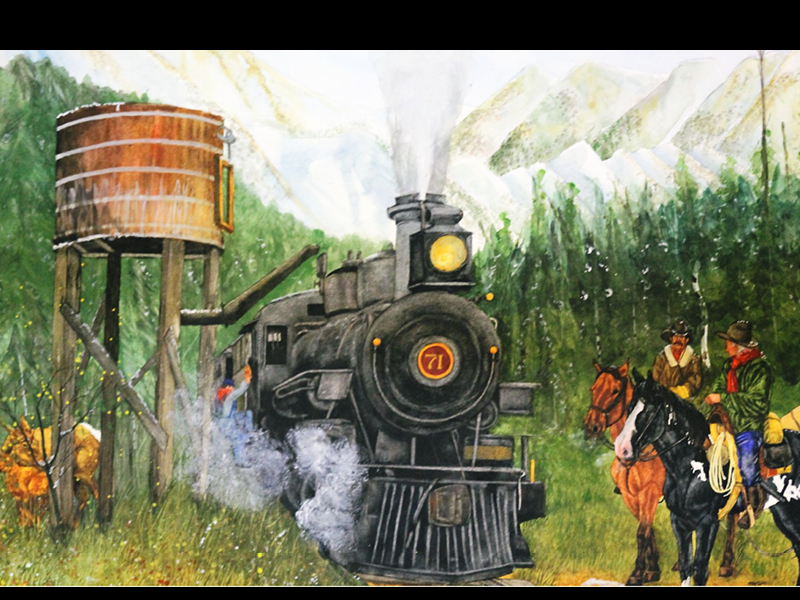 “High Country Encounter,” by Burl Washington.
“High Country Encounter,” by Burl Washington.
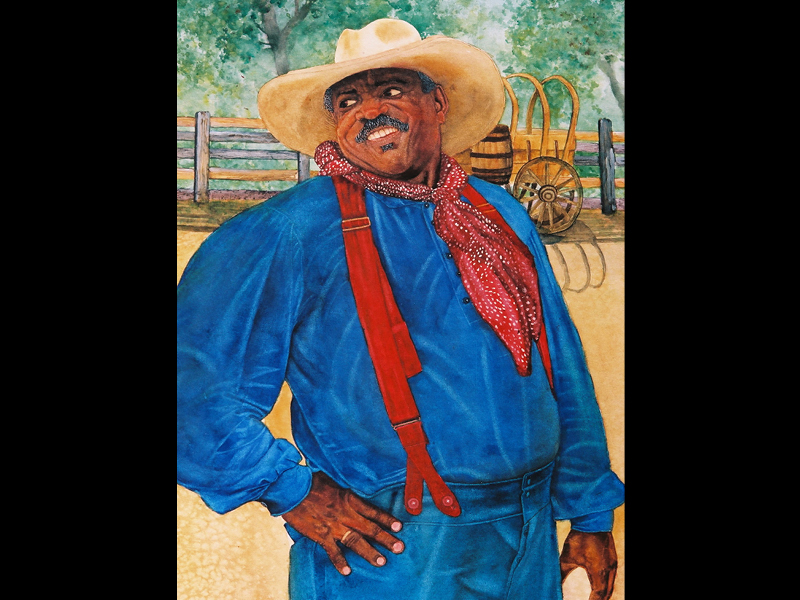
“U-Betcha” by artist Burl Washington

